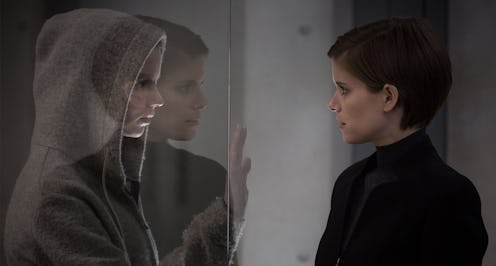
Many stories — whether written, filmed, or performed — ask the question, "What does it mean to be human?" But that theme is most explicitly stated in stories that compare and contrast humans to something other. And because it's only natural for an intelligent race to be obsessed with the future and its possibilities, that "other" is often something man-made. Two recent movies, though, have made this "other" female, and explored gender in complicated — if flawed — ways. Morgan , a sci-fi thriller opening Sept. 2, revolves around an A.I. named Morgan (Anya Taylor-Joy) who has the appearance of a human woman, but was formed by a group of scientists in a lab. Meanwhile, in last year's Visual Effects Oscar winner Ex Machina, Alicia Vikander plays a female-presenting A.I. who exploits gender bias to her benefit. Both films' subjects of fascination and fear are portrayed by women, yet while both Ex Machina and Morgan may seem feminist due to their female stars, the two films are problematic in that they portray womanhood as a unsolvable problem.
In film history, many A.I.s and man-made humanoid beings have resembled boys or men. Haley Joel Osment's David wants to be a real boy in A.I. Artificial Intelligence; Data is just one of the crew in some of the classic Star Trek movies; the Marvel Cinematic Universe's trusty J.A.R.V.I.S. calmly talked Tony Stark through many a scrape before becoming physically manifest as Vision. Yet when these kinds of characters are written as women, what audiences tend to get is not complex, human-life characters like the ones meant to be male, but either a pleasure-giving sex machine (quite literally) like the Fembots in Austin Powers: International Man Of Mystery or a mirror existing only to help the men around her self-actualize, like Scarlett Johansson's Siri-like presence in Her. With this context, Morgan and Ex Machina's Ava should in theory, be empowering, as their movies are about their own liberation. Yet in reality, this is not the case.
Though both movies' lead characters are played by women, they are treated very differently by their films. Morgan is a girl, for all intents and purposes. The scientists who engineered her and the experts who oversee her physical and mental development look on her as parents would a child. Morgan even calls the project's lead scientist "Mother." The audience sees a younger Morgan in sun-kissed flashbacks, running through fields, presenting a picked wildflower to a friend, and giggling when she gets a hug. Morgan's feminine appearance and demeanor engender a desire to protect her, so her eventual violent behavior is excused, even by its victims. Even when it gets worse, her transformation fits neatly into a puberty metaphor: a sweet, innocent girl becomes impossible to control (and impossible to love) when her biological imperatives take over.
Ex Machina is the trippier movie. It has a more complex relationship with gender than Morgan, because I believe the filmmaker attempted to undercut some sexist tropes, if not entirely successfully. In the film, Domhnall Gleeson plays a programmer who is invited by his company's peculiar CEO Nathan (Oscar Isaac) to his home to "test" the newest version of his A.I. Caleb becomes captivated by Ava's beauty and her desire to feel, at the same time rapidly losing trust in the Nathan and his motivations for doing this work. In the end, (spoiler alert) Ava plays the damsel in distress to perfection. She manipulates the emotions of one man and the crude sadism of another in order to gain her freedom. Ava is the hero of her own story, yet unfortunately, she still remains unknowable, with the male characters' motivations much clearer. After leaving her captors, Ava slips into society, just another babe whose aloofness at a bar will be explained away by a fairy tale about the mysteriousness of women.
Both Morgan and, especially, Ex Machina, have something interesting to say about humanity and arrogance, yet perhaps the result is not what the filmmakers — all of whom, for both movies, are male — intended. Intentionally or not, these movies feed into the idea that women and girls are either unmanageable because of their own emotions or constantly manipulating the men around them. Both films, whether or not they were originally meant to be, are about femininity developed by the observers rather than the experiencers. Morgan and Ava are both kept in locked, tidy rooms and observed around the clock. As the two movies show, even the most attentive bystanders are ultimately clueless about their subjects, and the women's actual desires and motivations aren't given nearly enough attention.
I appreciate the arguments that these movies make against ownership, and that the hammer falls on characters like Nathan who seek to exert control over a fully formed consciousness. But to uphold the concept of the enigma of femininity is to give men an excuse to write off what they don't immediately understand. These movies make me, a woman, feel like a science project, not a fully-formed person.
Science fiction and fantasy can provide incredible structure to talk about societal issues in an accessible and entertaining way, and Morgan and Ex Machina would have a different impact if women were as represented in that genre as they should be. It's inevitable that these A.I. characters read as allegory; they are an oversimplification in an otherwise desolate landscape of complicated women on film. It's troubling that though the movies' filmmakers seem to be seeking to present some kind of sweeping statement about gender, the women lead characters don't even get the same respect and complexity as the male supporting ones. I can't help but feel that we're going backwards, when it's easier to other a lead female character than to write a realistically human one.
Images: 20th Century Fox; Giphy (2)